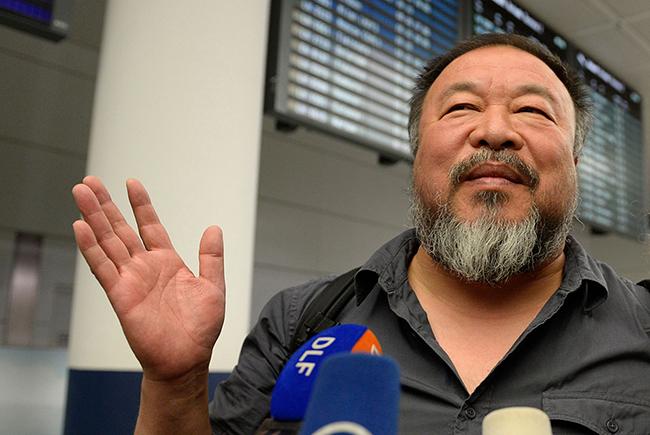China's most prominent artist, Ai Weiwei, says expects to be able to return to China
Chinese artist Ai Weiwei gives an interview as he leaves the Franz-Josef-Strauss airport in Munich, southern Germany, after his arrival from China on July 30, 2015. Chinese dissident artist Ai Weiwei was flying to Germany on his first overseas trip since he was arrested nearly four years ago, a week after receiving a new passport.
AFP PHOTO / CHRISTOF STACHE.
BERLIN (AFP).- China's most prominent artist Ai Weiwei, who arrived in Germany last week on his first overseas trip since his passport was confiscated four years ago, said Wednesday he expects to be able to return home.
In his first lengthy interview since his arrival in Munich on July 30, Ai told the Sueddeutsche Zeitung daily that he believes Chinese authorities are still keeping close watch on him but would not bar him from the country.
Asked what restrictions Beijing had placed on him when he was suddenly handed back his passport last month, the 57-year-old Ai said: "Nearly none," without elaborating.
"They also promised I could come back, which was very important to me," he said. "They said: you are a free person."
Asked whether he was under surveillance by the Chinese authorities in Germany, Ai replied: "Of course."
"They are keeping close tabs on what I say and do," he said, in comments published in German. "But it is very different from before -- the atmosphere is more open."
Chinese authorities confiscated Ai's passport after his 2011 detention on tax evasion charges, apparently attempting to limit his international influence for his outspoken criticism of the ruling Communist party.
After his passport was returned in July, Ai said that Germany had granted him a four-year multiple entry visa.
He was reunited with his six-year-old son at Munich airport upon his arrival and underwent medical tests in the southern city. He told the Sueddeutsche that doctors had given him a clean bill of health.
Ai expects to travel in the coming days to Berlin, where he has been offered a position as a guest professor at the University of Fine Arts.
He did not comment in the interview about plans to travel to Britain, where the interior minister last week ordered officials to grant him a six-month visa, reversing a decision to restrict him to a short trip that had prompted condemnation from rights groups.
© 1994-2015 Agence France-Presse
